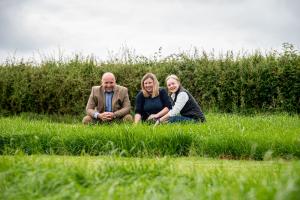Twenty-two ryegrass varieties bred by AFBI have been included on the recently released 2022/2023 Recommended Grass and Clover Lists (RGCL), with Tollymore and Crossgar included as new additions.

The high number of varieties originating from AFBI on these lists highlights the longevity and robustness of varieties from AFBI, which have been proven to perform consistently well in different regions and continue to perform well year on year under a wide range of environments and purposes. All of AFBI’s grass varieties are marketed through AFBI’s commercial partner Barenbrug UK Ltd.
The success of the AFBI forage grass breeding programme based at Loughgall, and supported by funding from the Department of Agriculture, Environment and Rural Affairs (DAERA) is clear. Since 1998, 38 improved forage grass varieties have entered forage grass variety recommended lists around the UK and Ireland, at a rate of 1.5 per year. Each of these varieties has been tested against its peers by national testing authorities across the UK and Ireland, and only gained a place on a recommended list after showing a clear improvement in performance against varieties already on the list.
AFBI’s two newest varieties on the 2022 RGCL include the tetraploid variety Tollymore, which heads on the 22 May, and Crossgar, a late heading diploid variety, heading on the 4 June. Both varieties will also be included on the Recommended Grass and Clover List for Scotland in 2022.
Both Tollymore and Crossgar are excellent all-around performers across the season, producing high annual yields of good quality grass under both grazing and silage management. Tollymore is excellent for use in early grazing situations, yielding more than any other intermediate tetraploid variety throughout the spring. But Tollymore also performed extremely well across the grazing season, producing a metabolizable energy (ME) yield well above it competitors. It achieved 105% of the mean of the intermediate tetraploid control varieties. ME is the amount of energy in the sample that is available for the animal, and is calculated from the digestibility of the grass (D value).
Extensive research has shown that ruminant performance increases when forage contains higher amounts of ME and with increasing D-value. For, example, research at NIAB has shown that a single point increase in D-value equates to 40g/day extra beef liveweight gain, 0.26 litres of milk per dairy cow per day, and 20g/day of extra lamb liveweight gain. Research also shows that more digestible forage can have a higher rate of feed passage, reducing the duration of exposure of the feed to ruminal digestion, and potentially reducing methane emissions.
AFBI’s portfolio is full of accolade-winning new varieties bred specifically for different silage and grazing situations. However, of particular note is Galgorm, one of the best intermediate heading diploid varieties currently available in the UK. Galgorm first entered recommended lists in the UK in 2018, and has maintained its position at the top of the intermediate diploid category for total yield since then under both grazing and silage management, with no other intermediate diploid variety on the RGCL producing more ME yield per hectare under grazing management. Galgorm is a truly special variety that is fast turning into a ‘once in a generation’ production. Another outstanding variety on the recommended lists across the UK and ROI is Gracehill, a late-heading variety of the tetraploid type, which attained the coveted spot of the best-performing late-heading perennial ryegrass variety in ROI in 2021, confirming its position as one of the very best available forage grass varieties available.
New varieties have shown consistent and significant improvements in traits such as yield, digestibility and disease resistance, with annual yield improvements shown of 0.52% under silage management and 0.35% under grazing, demonstrating the continual improvement of new forage grass varieties. But, as both environmental and consumer needs change, the availability of new varieties with improvements for traits such as nutrient efficiency, to offset fertilizer reduction, and carbon sequestration, to help industry meet its net carbon emission goals, will be more important than ever. Only through breeding can sustained improvements in grassland be made. The AFBI forage grass breeding programme aims to be part of this ‘green’ livestock production future.
Recommended Grass and Clover List | AHDB
Notes to editors:
AFBI is an arms-length body of DAERA delivering research and development, diagnostic and analytical testing, emergency response capability and expert scientific advice for DAERA and other government departments, public bodies and commercial companies in Northern Ireland, and further afield.
AFBI’s Vision is “Advancing the Local and Global Agri-Food Sectors Through Scientific Excellence”.
AFBI’s core areas:
- Leading improvements in the agri-food industry;
- Protecting animal, plant and human health;
- Enhancing the natural and marine environment.
Latest news
- AFBI issues Nematodirus warning – Spring 2025 11 April 2025
- Managing Nature Based Risks to the UK Economy and Opportunities for Green Finance 08 April 2025
- AFBI Hillsborough host AERA committee 27 March 2025
- The Omics Days Conference 27 March 2025
